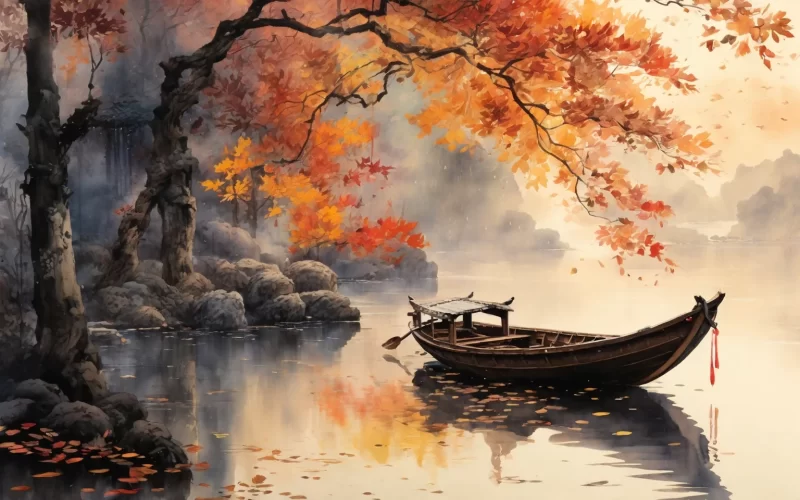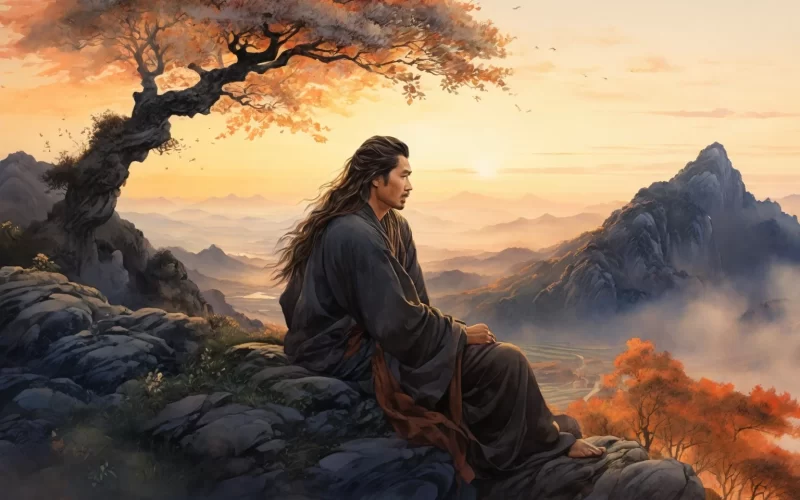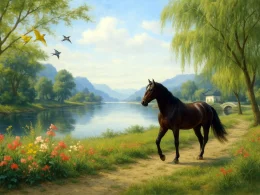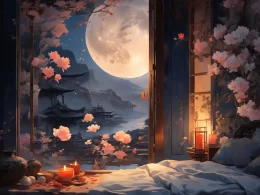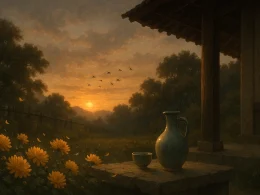Drinking wine all day long,
I won't keep my mind sane.
Seeing the drunken throng,
Could I sober remain?
Original Poem
「过酒家 · 其二」
王绩
此日长昏饮,非关养性灵。
眼看人尽醉,何忍独为醒!
Interpretation
Written during the turbulent transition between Sui and Tang dynasties, this poem reflects Wang Ji's profound disillusionment with political corruption and social chaos. Having resigned from his official post, the poet expresses through drunkenness his solitary resistance against a decadent world, embodying the ancient lament of "all the world is drunk while I alone am sober."
First Couplet: "此日长昏饮,非关养性灵。"
Cǐ rì cháng hūn yǐn, fēi guān yǎng xìnglíng.
These days I drown in endless wine, Not to nurture soul divine.
The opening lines reject the conventional Taoist justification of drinking for spiritual cultivation. Instead, the poet confesses his inebriation stems from anguish over a crumbling world, where intoxication becomes both protest and refuge.
Second Couplet: "眼看人尽醉,何忍独为醒!"
Yǎn kàn rén jìn zuì, hé rěn dú wéi xǐng!
Seeing all men drunk, blind and base, How can I bear sober disgrace?
The climactic couplet transforms drunkenness into moral allegory. The "drunkenness" of society symbolizes moral oblivion, making the poet's painful sobriety an act of lonely integrity. His rhetorical cry captures the torment of maintaining clarity in an age of collective delusion.
Holistic Appreciation
Though merely twenty characters long, this poem brims with fierce emotion and profound depth. The poet uses "drunkenness" to mask "lucidity," with wine serving as a veil to express his discontent with the era and the anguish of his soul. He is not truly intoxicated by drink but rather finds no path to clarity in a chaotic world—imbibing becomes both spiritual self-preservation and ironic defiance. Without directly critiquing contemporary governance, the poem constructs an inverted moral order through the contrast between "all drunk" and "alone awake," jolting readers into awareness. Its language is stark yet resonant, reflecting both personal fate and the collective conscience of society.
Artistic Merits
The poem's language is unadorned yet potent, employing irony and contrast to heighten emotional tension. Ostensibly about "drunkenness," it truly speaks of "awakening"; seemingly an escape from reality, it is in fact a cold-eyed revelation. Through self-negation—"long drowning in drink" yet "not for nurturing the spirit"—it unfolds into social critique: "all men are drunk." Its brevity belies profound meaning, achieving a unity of distilled form and philosophical depth. This exemplifies Wang Ji's austere, incisive style and embodies the Tang transitional aesthetic pursuit of clarity and candidness.
Insights
This poem reveals, through minimalism, a timeless dilemma: when all choose intoxication, evasion, or conformity, the truly awake stand isolated. Wang Ji's "alone awake" lays bare the intellectual's painful clarity in turbulent times, prompting us to reflect: faced with society's tide, do we drown with the crowd or guard our essence in solitary wakefulness? In extreme concision, the poet sketches a spiritual predicament—one that stirs deeper inquiry into truth and human nature.
Poem translator
Xu Yuanchong (许渊冲)
About the poet
Wang Jie (王绩), circa 589 - 644 AD, a poet of the Tang dynasty, courtesy name Wugong and sobriquet Donggaozi, was a native of Wannong, Shanxi. Known for his aloof and straightforward nature and fondness for wine, his poetry is characterized by its sincerity, naturalness, and lofty, free-spirited style.







